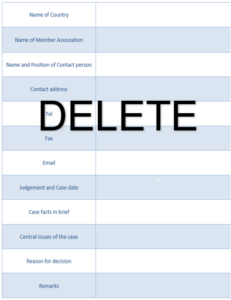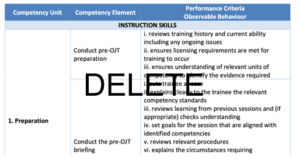61ST ANNUAL CONFERENCE, 23-27 May 2022
WP No. 80
TPM Review – Part IV (General Amendments)
Presented by PLC
|
Summary
Over the past few years, PLC came to the conclusion that the TPM was in need of a significant overhaul in order to ensure consistency throughout the manual and with ICAO. Every year, several slight changes are made to individual policies, but there is a need to look at the entire TPM in a holistic way.
Introduction
1.1. The TPM is the main document used by TOC, PLC, ICAO representatives and other liaison officers as well as Member Associations, when there is a need to advocate a position on behalf of IFATCA or to push IFATCA’s policies at the global level. It is obvious that, for these reasons, the manual has to be as up to date as possible and as easy to use and refer to as it can be; this brings the need for a significant update this year.
1.2. This paper is one of multiple papers that will look at some proposed changes to policies. In this paper, items are proposed for deletion from the manual, since the text is not proper policy or is outdated. In some cases, the text is rather guidance material and it is proposed to make it available on the IFATCA website as such.
Discussion
2.1. The following text from LM 11.2.6 is already struck out in the manual and shall be removed, since there is a resolution ordering its deletion:
| IFATCA TPM (2019), LM 11.2.6 |
| Proposal:
Audio, visual and area recordings, together with associated computer data and transcripts of air traffic control communications are intended to provide a record of such communications for use in the monitoring of air traffic control operations, and the investigation of incidents and accidents. Such recordings are confidential and are not permitted to be released to the public. Such recordings are not to be used to provide direct evidence such as in disciplinary cases, or to be used to determine controller incompetence.
[2.6.2] Except for area recordings, recorded data shall only be used in the following cases:
a) when investigating ATC related accidents and incidents;
b) for search and rescue purposes;
c) for training and review purposes provided all ATCOs affected agree;
d) for the purposes of adjusting and repairing ATC equipment. Area recordings shall only be used for accident investigation purposes.
[…]
An area recording may generally be defined as any type of recording, audio and / or visual, instituted in an air traffic control operations room that records accurately the conversation of controllers and the environment within an air traffic control operations room on a continuous basis.
Access to recorded data shall be limited to authorised personnel for the purposes listed in 2.6.2 above. Authorised personnel shall be mutually agreed by the controllers’ representative and the appropriate authority.
Recorded data used shall be identical as presented to and / or originated by the controller at the relevant controller’s position.
IFATCA is opposed to the use of Visual Area recordings for reasons of invasion of privacy. Prior to the installation of Area recorders, legislation shall be in place which prohibits the use of any area recorder information against a controller in any criminal or civil litigation or disciplinary proceedings of any kind. The legislation should provide for substantial penalties for any breach of the legislation.
Except when an accident occurs, area recordings shall be capable of being erased when a controller is relieved from his position. Controllers shall have prompt confirmation of the erasure. Agreement between the Member Association and the employer on procedures for the erasure of area recordings shall be established prior to the operation of area recorders. |
|
2.2. LM 11.3.3 and LM 11.3.3.1 ATTACHMENT: DATABANK OF JURISPRUDENCE REPORTING FORM: Since 2000, IFATCA Office has received zero form. The policy and its attachment should be deleted, since it has been almost twenty years now and since there is nowadays a thousand other ways to obtain such information.
| IFATCA TPM (2019), LM 11.3.3 and LM 11.3.3.1 ATTACHMENT |
| Proposal:
A databank of jurisprudence relating to legal proceedings involving ATCOs shall be maintained by IFATCA. The information in the databank will be made available to all Member Associations on request to the IFATCA Office.
The Reporting Form be included as an attachment in the IFATCA [T. & P.] Manual
[…]
Reporting Form: Please note your personal contact details will not be published.

Please return this form to: Chairman PLC – IFATCA, 360 St Jacques, Suite 2002, Montreal, Quebec H2Y 1P5, Canada (Fax +1 514 866 7612) |
|
2.3. In WC 8.3.2, there is a definition of Operational Duty. This definition should be moved to the “Acronyms and Terms” section, where it belongs.
| IFATCA TPM (2019), WC 8.3.2 |
| Proposal:
Definition:
Operational Duty: The period which a controller is actually exercising the privileges of the controller’s licence at an operational position.
[EDITORIAL NOTE: MOVE TO “ACRONYMS AND TERMS”.] |
|
2.4. In WC 8.3.5, there are definitions of Extra Duty and Non-operational Duties. These definitions should be moved to the “Acronyms and Terms” section, where they belong.
| IFATCA TPM (2019), WC 8.3.5 |
| Proposal:
Extra duty is defined as any operational or non-operational duty or a combination of both performed outside of the scheduled hours of work which will result in an increased total duty time for the controller.
Non-operational duties are other duties for which the controller is not required to exercise the privileges of the controller license which, from time to time, are assigned to a controller (Theoretical controller training, investigation, etc.).
[EDITORIAL NOTE: MOVE TO “ACRONYMS AND TERMS”.] |
|
2.5. In TRNG 10.2.9, there is a definition of E-learning. This definition should be moved to the “Acronyms and Terms” section, where it belongs.
| IFATCA TPM (2019), TRNG 10.2.9 |
| Proposal:
E-learning can be defined as the delivery of training over an electronic network (technology facilitated learning) or as stand-alone distance learning with the aid of a computer terminal.
[EDITORIAL NOTE: MOVE TO “ACRONYMS AND TERMS”.] |
|
2.6. In LM 11.2.6, there is a definition of Ambient Workplace Recording (AWR). This definition should be moved to the “Acronyms and Terms” section, where it belongs.
| IFATCA TPM (2019), LM 11.2.6 |
| Proposal:
Audio and visual recordings and Ambient Workplace Recording (AWR), together with associated computer data and transcripts of air traffic control communications are intended to provide a record of such communications for use in the monitoring of air traffic control operations, and the investigation of incidents and accidents.
[EDITORIAL NOTE: MOVE TO “ACRONYMS AND TERMS”.] |
|
2.7. Within the TPM, there are several sections of text that are in fact guidance material, rather than policy. The information would be better used if presented as guidance documents and be made available on the IFATCA website. It is proposed to remove the information/sections listed below from the TPM and make it available in the form of downloadable PDF documents, from the website.
2.7.1.
| IFATCA TPM (2019), WC 8.2.13 – EDUCATIONAL ISSUES ON DISTRACTION (GUIDANCE MATERIAL) |
| Proposal:
Air Traffic Control Officers (ATCOs) are exposed to different kinds of distractions in their daily operations. These distractions may have a disruptive effect on ATCOs performance and result in errors or omissions which compromise aviation safety. In order to reduce distractions in the air traffic environment and enhance safety, it is essential to educate ATCOs on understanding distractions, their sources and affects on ATCOs performance, and develops prevention strategies to minimise their effects.
[…]
[EDITORIAL NOTE: NOT REPRODUCED ENTIRELY IN THIS WORKING PAPER.] |
|
2.7.2.
IFATCA TPM (2019), WC 8.8 ATTACHMENT –
WC 8.8.1 MODEL OF EMPLOYMENT AGREEMENT |
| Proposal:
IFATCA POLICY DOCUMENT ON MODEL OF EMPLOYMENT AGREEMENT (Established Tunis 1996)
NOTE: The following suggested Employment Agreement is intended as a guide to whom MAs may aspire. These guidelines suggest a lay-out, items that may be included, and reflect IFATCA policy where it applies. MAs should modify this document to reflect their own aspirations and national conditions.
[…]
[EDITORIAL NOTE: NOT REPRODUCED ENTIRELY IN THIS WORKING PAPER.] |
|
2.7.3.
| IFATCA TPM (2019), MED 9.3.1 – CRITICAL INCIDENT STRESS MANAGEMENT (MODEL OF A SUGGESTED COURSE DESIGN) |
| Proposal:
1. INTRODUCTION
The provision of appropriate psychological assistance for air traffic controllers has been a policy of the Federation since 1986. Critical Incident Stress Management (CISM) in Air Traffic Control is a relatively new concept; and is only one, though crucial, form of psychological assistance which should be provided for air traffic controllers.
[…]
[EDITORIAL NOTE: NOT REPRODUCED ENTIRELY IN THIS WORKING PAPER.] |
|
2.7.4.
| IFATCA TPM (2019), TRNG 10.3.2 – TRAINING FOR ON-THE-JOB-TRAINING- INSTRUCTORS (OJTI) (GUIDANCE MATERIAL) |
| Proposal:

[…]
[EDITORIAL NOTE: NOT REPRODUCED ENTIRELY IN THIS WORKING PAPER.] |
|
2.7.5.
IFATCA TPM (2019), TRNG 10.6 ATTACHMENT –
TRNG 10.6.1 IFATCA POLICY DOCUMENT ON TRAINING |
| Proposal:
TRNG 10.6.1 IFATCA POLICY DOCUMENT ON TRAINING
2nd Edition February 1989
Amended Geneva 01.C.10
Edited Istanbul 07
IFATCA PUBLICATIONS
1. INTRODUCTION
The International Federation of Air Traffic Controllers’ Associations (IFATCA) lists among its objectives – “to promote and uphold a high standard of knowledge and professional efficiency among Air Traffic Controllers”.
[…]
[EDITORIAL NOTE: NOT REPRODUCED ENTIRELY IN THIS WORKING PAPER.] |
|
2.7.6.
IFATCA TPM (2019), LM 11.2.8 ATTACHMENT –
IFATCA POLICY ON ACCIDENT AND INCIDENT INVESTIGATION |
| Proposal:
LM 11.2.8 ATTACHMENT: IFATCA POLICY ON ACCIDENT AND INCIDENT INVESTIGATION
IFATCA POLICY ON ACCIDENT AND INCIDENT INVESTIGATION
MARCH 1992 Amended 2004, 2006 and 2012
Introduction
The International Federation of Air Traffic Controllers’ Association (IFATCA) lists among its objectives – “to promote safety, efficiency and regularity in International Air Navigation”.
[…]
[EDITORIAL NOTE: NOT REPRODUCED ENTIRELY IN THIS WORKING PAPER.] |
|
2.7.7.
IFATCA TPM (2019), LM 11.4.1 ATTACHMENT –
POLICY DOCUMENT ON UNLAWFUL SEIZURE OF AIRCRAFT AND UNLAWFUL INTERFERENCE WITH CIVIL AVIATION AND ITS FACILITIES |
| Proposal:
1. Introduction
IFATCA, established in 1961, is a non-profit, non-political professional federation having as its main objectives the safety, efficiency and regularity of international air navigation, assists and advises in the development of orderly systems of air traffic control.
[…]
[EDITORIAL NOTE: NOT REPRODUCED ENTIRELY IN THIS WORKING PAPER.] |
|
2.7.8. ILO Meeting of Experts on Problems concerning Air Traffic Controllers: while the document contains valuable information, it dates from 40 years ago. The report from this meeting should be extracted from the TPM and archived as a separate document that would be posted on the website.
| IFATCA TPM (2019), ILO Meeting of Experts on Problems concerning Air Traffic Controllers |
| Proposal:
International Labour Organisation
MEETING OF EXPERTS ON PROBLEMS CONCERNING AIR TRAFFIC CONTROLLERS (Geneva, 8-16 May 1979)
REPORT
1. In accordance with the decisions taken by the Governing Body of the International Labour Office at its 201st Session (November 1976) on the recommendation of the Preparatory Meeting for Civil Aviation (Geneva, 3-10 October 1974), a Meeting of Experts on Problems concerning Air Traffic Controllers took place at the ILO headquarters, Geneva from 8 to 16 May 1979. It held 14 sittings.
[…]
[EDITORIAL NOTE: NOT REPRODUCED ENTIRELY IN THIS WORKING PAPER.] |
|
Conclusions
3.1. The TPM is in need of a significant overhaul in order to ensure consistency throughout the manual and with ICAO. This paper is one of several papers addressing this issue, addressing in particular the need to remove guidance material from the manual and moving definitions to the appropriate section.
Recommendations
4.1. It is recommended that the abovementioned sections of the Technical and Professional Manual (TPM) be removed or moved accordingly, as described in Section 2 of this working paper.
References
IFATCA. (2019). IFATCA Technical and Professional Manual (TPM). 2019 Ed. Montréal, Canada: International Federation of Air Traffic Controllers’ Associations.




